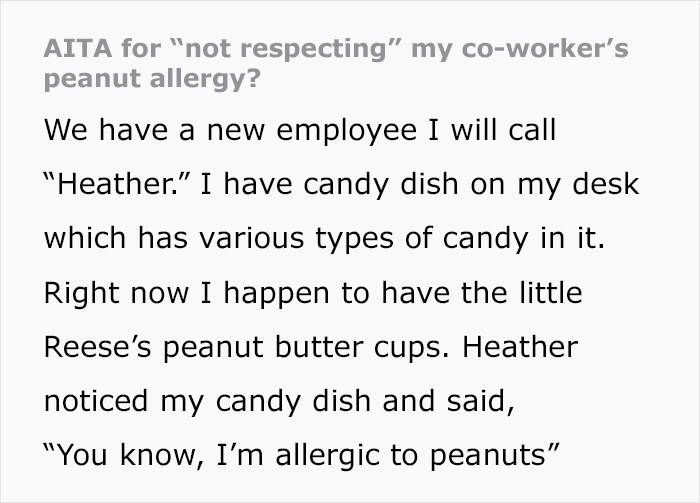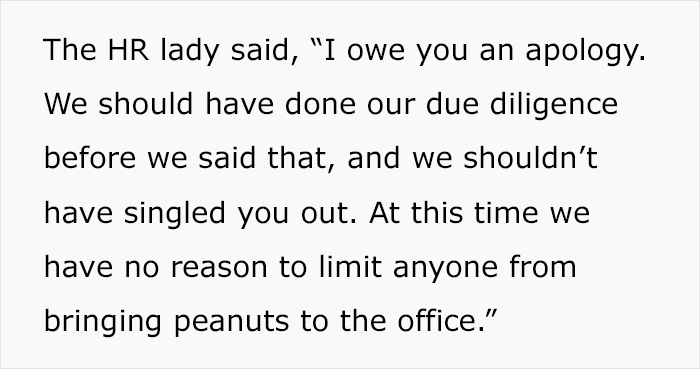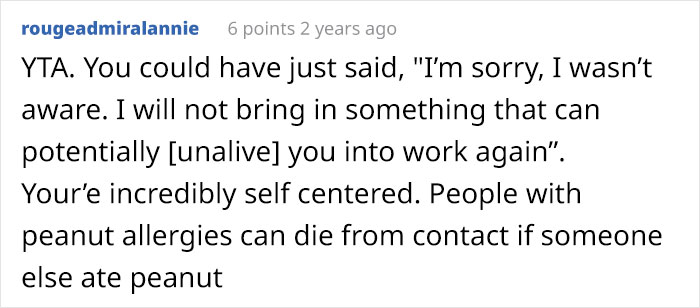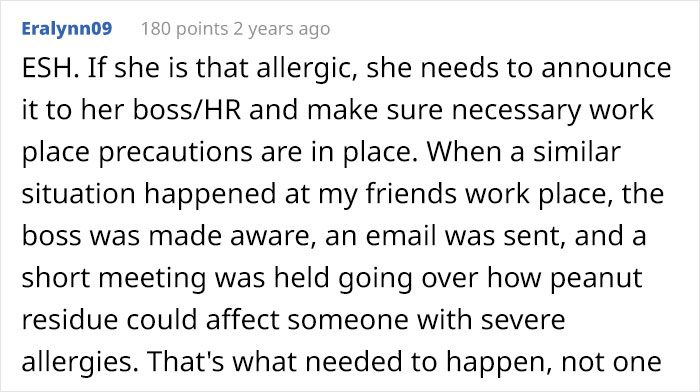Nobody said you have to be friends with your colleagues. For most of us, tolerating them to keep the relationship civil is enough, and genuinely getting along is truly a blessing. But when an annoying coworker fails to manage their emotions and resolve disputes in a professional manner, it’s a one-way ticket to the unnecessary drama that erodes and undermines trust within the team.
In this case, the subject matter that takes center stage is allergies. Reddit user AITA199O reached out to the popular AITA community to ask people for advice after finding themselves in an argument… over a candy dish. It all started when a new employee, Heather, noticed Reese’s peanut butter cups on the user’s desk. She announced being allergic to peanuts and the author assured her she would not buy such candy in the future.
Under normal circumstances, things would have ended there. But instead, Heather started accusing the employee of being insensitive and “not respecting” her condition. What followed led to a heated argument and a lecture from HR that instantly sparked tension in the office. Let’s see the whole incident in full right below, and be sure to weigh in on the discussion in the comments!
This person asks if they were wrong to refuse to get rid of Reese’s cups from their desk since the new employee is highly allergic to peanuts

Image credits: Sarah Sphar (not the actual photo)
After being accused of “not respecting” the coworker’s allergy, they asked the internet to evaluate the situation





Image credits: Ketut Subiyanto (not the actual photo)



Later on, the user added a few updates about the incident








Image credits: AITA199O
At first, the argument between the two coworkers seemed like a minor issue, but the situation went from zero to 100 in a matter of seconds. The story immediately caused a stir on the platform, with some users siding with the author and others deeming they were completely in the wrong.
However, such conflicts are more common than we think. In fact, it’s a given that people disagree at work. Whether between employees or between them and the management, disagreement is an inevitable part of the working environment. But while sometimes little debates are healthy and can lead to more involvement, creating unnecessary tensions can have dire effects on a person’s well-being.
According to a 2014 study by FairWay Resolution, 24% of employees in New Zealand had at least one disagreement or argument at their workplace that was serious enough to impact their ability to do their job. The top types of conflict were all work-related: differences in opinions about how to perform a task (21%), procedures or policies not being followed (17%), and working conditions and hours (14%).
Other top reasons were relationship conflict, particularly personality clashes or bullying (13%) and a bad attitude towards co-workers (10%). Alarmingly, these arguments are negative and unproductive, as they have nothing to do with the actual work and can last either several days or more than one month. “The longer the duration of the conflict, the greater the impact on the directly affected employees’ performance, and the performance of those supporting them from within the workplace,” the report stated.
To gain insight from an expert in the field, we reached out to Sunny Patel, a UK-based career-change coach aiming to help professionals find careers that excite them. According to him, arguments at work are often the result of a lack of communication. “We often take for granted that work is a ‘professional’ space and that the dynamic is shaped by that,” he told Bored Panda.
“In reality, most of us spend more time with colleagues than with friends and family. We’re sharing our space with people for a large amount of time, and communication, boundaries, and clarity are all just as important, as such they all need to be communicated,” Patel added.
Then the employee joined the discussion in the comments to clarify some details


Patel pointed out that referring to our colleagues and work friends as family is a cliché. Branding your company as one can even bring out toxic effects. However, the career coach explained that creating positive relationships with our coworkers sometimes requires just as much effort.
“Each team has a dynamic, and the vibe in the air at any given time shapes the environment for everyone,” he explained. “In these situations, the best leaders take things aside and de-escalate/resolve them away from the team as best they can.”
We also asked Patel to evaluate this particular situation. The career coach told us that in this case, when it comes to allergies, asking colleagues to take certain steps to keep the area “nut-free” is completely within reason. “Whether that’s a note on their desk, asking the team, or sending an e-mail. It’s such a fair request that there is no reason not to share it, just in a calm manner.”
“Should that fall short, then raising it to management as a legitimate health risk would also be fair,” Patel suggested. “If a collective approach doesn’t gather the whole team, then why not speak calmly to the specific person in question?” After all, conflict resolution is all about communication. It’s important to respect your coworkers and strive to settle conflicts as swiftly and calmly as possible so everyone can exist peacefully in the office.
We would love to hear your thoughts on this matter down below. Where do you land on this issue? Have you ever experienced similar situations at your office? Feel free to share your thoughts with us in the comments!
The post caused quite a stir in the community, with some people siding with the user








Others were on the fence or immediately deemed the employee was wrong, saying the coworker’s health should be the most important





 Follow Us
Follow Us




